Possible Repurposing of Black Box
During a faculty meeting on April 7, the administration announced plans to repurpose the Black Box into a flexible space during school hours. Currently, the Black Box serves as theater classroom and English teacher Nancee Beilgard’s classroom. The proposed changes would move Beilgard and her classes out of the room during school hours in order to open up the space for large groups to use.
“We are growing at a rate of 1-2%. So next year, we’ll be well over 1,700 students,” principal Myron Graber said. “We use every classroom and every space to the max. So we’re slowly running out space.”
The administration first discussed the idea of creating more flexible space immediately after winter break according to Graber.
“…If we wanted to do something with 30 to 40 students, you’re either in the Commons… or the large auditorium which is not good.” Graber said.
Having meetings or testing in the Commons or auditorium is inconvenient because the space is too large, has spotty wi-fi access and echoes according to Graber.
“Currently … the Black Box is scheduled … every class period of the day.” Graber said.
Acting classes would still be able to use the Black Box if they scheduled it with administration beforehand, but they could not rely on having the space regularly Graber said.
Despite the intention of using the Black Box more efficiently, moving the acting classes out of the Black Box could impact Beilgard’s curriculum and students.
“As a teacher of theater this would impact me profoundly,” Beilgard said in an email. “I use this space on a daily basis. My acting students use the stage to rehearse and perform. My introductory students use the space to learn and explore the theater. It is a ‘home’ to the acting students.”
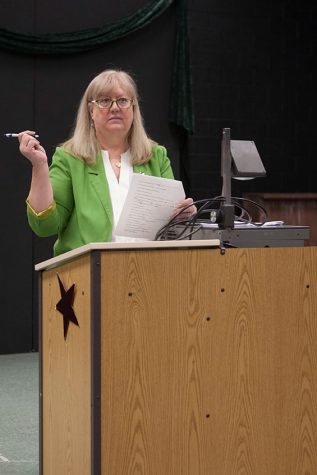
Nancee Beilgard makes a presentation in the Black Box. Beilgard teaches her english and acting classes in the Black Box.
Beilgard emphasizes the Black Box was designed as a theater space. Acting students take advantage of the space by using the lighting and acoustics that amplify and project voices according to Beilgard.
“To use [the Black Box] as ‘flex-space’ whether to conveniently house noisy groups of students or to hold meetings seems inappropriate,” Beilgard said.
A large group of theater and non-theater students have openly opposed the decision. When juniors Morgan McReynolds and Jake Clark heard about re-purposing the Black Box, they organized a petition to keep the Black Box as a space for theater education. The petition has been signed by over 150 people as of May 4.
“The Black Box is important because it is the space that Free State has assigned to the theater kids here,” McReynolds said. “Black boxes are important for any theater group.”
McReynolds made a comparison to sports teams and how each team has their own space to practice and compete.
“The principle of it [is] very upsetting,” McReynolds said. “You have a group of students at a school who do a certain thing- they should have a place that is theirs… Students know that, and they should be upset that [theater students] are not getting equal treatment. If they were taking away the football field from the football players, I would be upset about that.”
Outside of the theater department and administration, the general consensus is mixed on whether the Black Box change is a good thing. Special Education department chair Anita Nelson said not having enough flexible space makes it difficult to hold meetings.
“I have over 50 teachers, related service providers and paraprofessionals in my department and when we meet as a group, there is rarely a space that can accommodate us.” Nelson said in an email. “We have to try to find spaces for training activities and meetings without having standing room only, which makes it difficult.”
Nelson said large meetings in the Commons can be problematic.
“Many times, when Free State is trying to host large groups, the Commons area becomes the flex space and the noise level can be disruptive to classes closest to the area,” Nelson said. “If they could be moved to the Black Box, it would allow them to be loud and participate fully without disrupting other classes.”
Some teachers support the need to continue using the Black Box space for its original purpose.
“Environment matters,” English teacher Laurie Martin-Frydman said in an email. “Having the appropriate sized room matters. For drama students, taking classes and practicing acting skills in a performance space is very different than developing these skills in a cramped classroom. I think students and parents will take this decision as a sign that the theater program isn’t as valued by our school as it once was, regardless of whether or not that is the case.”
Frydman also discussed how this will impact the faculty as well as the student body.
“When we lose teachers and support staff, when our programs are undermined due to space and budget concerns – we all lose. These losses are demoralizing to the teachers,” Frydman said. “But these losses are also demoralizing to students who love the arts. And love electives. And love education. And love our school.”
Both Nelson and Frydman agree budget issues and lack of state funding contribute to the school’s lack of space. There are plans to create a 40 million dollar bond to refurbish and update high schools and middle schools in the district Graber confirmed. Graber pointed out a significant portion of the bond will go to Lawrence High because of their aging building, while the rest of the bond will be split between the remaining of the schools. Raising more than 40 million dollars would require a tax increase, but Graber is confident Lawrence would be open to higher taxes in order to support public schools.
The proposal to change the Black Box is still pending, and it is unknown whether it will pass.
Your donation will support the student journalists of Lawrence Free State High School. Your contribution will allow us to purchase equipment and cover our annual website hosting costs.


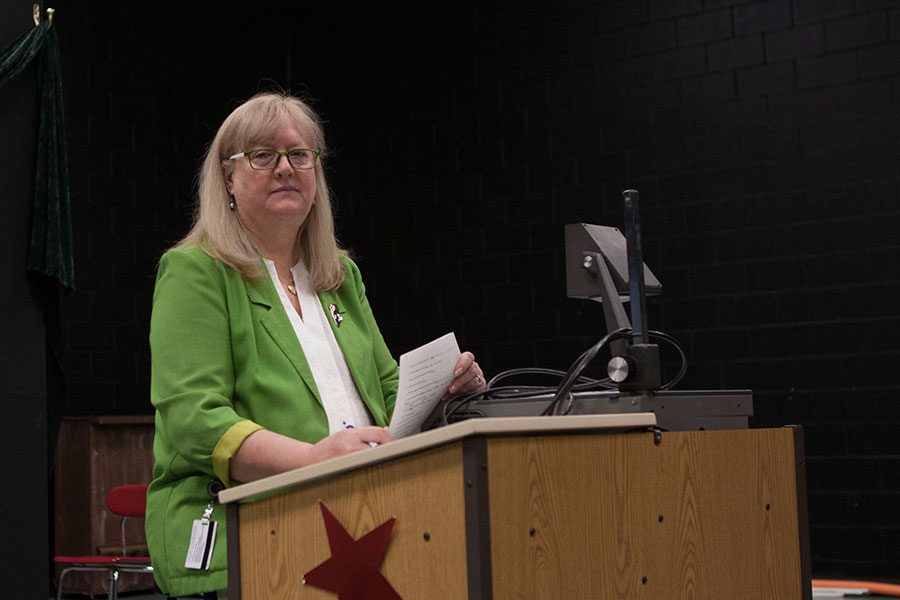


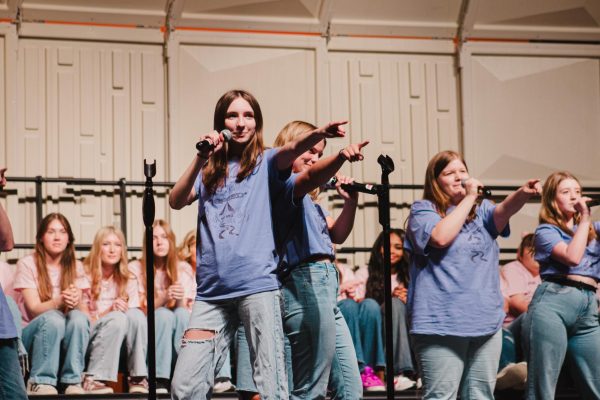


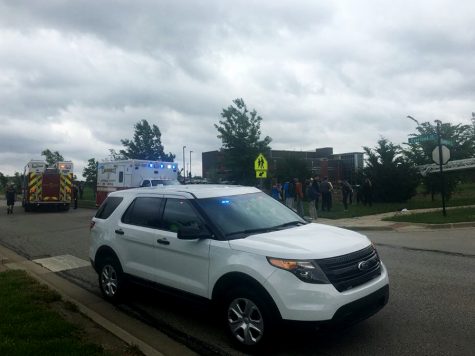
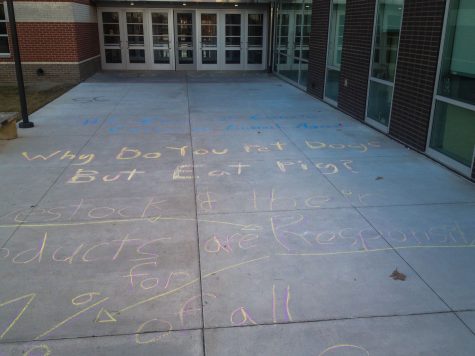
Stacey VanHouten, ex Freestate Parent • May 8, 2016 at 9:01 pm
I am disturbed by this plan. Both of my children were “arty” children, performing in plays, singing in choir, etc. What this plan is saying is that these children and this subject are not as important as others. Why take Black Box versus some other classroom? The article mentions that it is used all throughout the day, so the student and teacher disruption will impact folks all day. I can find no logical reason that classroom space, built solely to accomodate theater classes, should be appropriated for meetings just because other actually available space is noisy. How is the decision to take learning space away from that function and give it to meetings? How about those classrooms attached to the football field? How about a history classroom? An English classroom? Freestate has always been the school that valued kids other than athletes, but with this decision, it appears that Freestate does no longer support those other students. Shame on you, Mr. Principal.
Steven • May 7, 2016 at 9:10 pm
As a past student who had classes in the black room i know how it was used for regular classes, I agree that you shouldn’t remove the theater classes out. The regular classes that are in there could be moved around because I had mythology class and half of the room was not used
Jeannette Bonjour • May 7, 2016 at 4:39 pm
I was in charge of the theater program at Free State from its opening in 1997 through May of 2000. The black box was an integral space for our program, both during the school day and as part of our season. The training and practice space it provides are invaluable: when I taught at Free State, my Acting II and Acting III classes were usually combined (even though the curriculum was very different). In order to accomplish all of the instruction and rehearsal necessary to accommodate two different curriculum, the black box was a necessity.
As part of the theater season, we always produced one play in the black box, as well as a week-long student produced play festival. Those shows gave even more students opportunities to participate, and gave those intent on pursuing careers in the performing arts the chance to work in yet another theatrical space.
I can only assume that the black box is as vital to the current theater department as it was for us at the very beginning. Therefore, I urge the current administration to find another solution to their space needs. The commons area always worked for us for faculty meetings and district in-services. I’m sure there’s a fix that won’t send the message that Free State no longer values the drama program as highly as it once did.